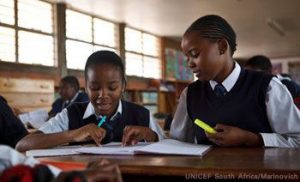The United Nations General Assembly proclaimed 24 January as the International Day of Education, in celebration of the role of education in peace and development.
This year’s celebration which is the fifth is being done under the theme “to invest in people, prioritize education”. Building on the global momentum generated by the UN Transforming Education Summit in September 2022, this year’s Day will call for maintaining strong political mobilization around education and chart.
The International Day of Education Focuses on the right to an education that is enshrined in article 26 of the Universal Declaration of Human Rights. The declaration calls for free and compulsory elementary education.
The convention of the Rights of the child, adopted in 1989, goes further to stipulate that countries shall make higher education accessible to all.
International Day of Education is observed annually to re-evaluate education in the lives of children as well as identify and address the issues of education globally and is also a theme to invest in people and prioritize education.
This day is envisioned to promote gender equality, inclusivity, and poverty eradication through quality education and democratic participation. Education is an investment that holds the power to change the present into a sustainable future.
A well-known anti-apartheid activist and politician who served as the first president of South Africa once said and I quote ‘Education is the great engine of personal development. It is through education that the daughter of a peasant can become a doctor, that the son of a mine worker can become the head of mine, and that a child of farm workers can become the president of a great nation. It is what we make out of what we are given, that separates one person from another – Nelson Mandela.
We definitely cannot tackle all the problems at once; instead, we eliminate them one by one. And one of the best tools to eliminate the World problem is Education. Education is the lighthouse to promote gender equality, diminish poverty by educating people and offering them new opportunities and solve the global crisis by allowing educated and talented minds to put forward their ideas to make the world a better place.
The children of today are gearing up to become adult citizens of tomorrow but poverty is rapidly breaking the ladder and a path to a promising future. The world record has it that over 262 million children and adolescents around the globe miss out on the chance to set foot in a school or even finalize their education.
Without inclusive and equitable quality education and lifelong opportunities for all, countries will not succeed in achieving gender equality and breaking the cycle of poverty that is leaving millions of children, youth, and adults behind.
Today, 244 million children and youth are out of school, and 771 million adults are illiterate. Their right to education is being violated and it is unacceptable. It’s time to transform education.
The right to education is persistently violated as the number of children who cannot read and do basic math increases day by day. Less than 40% of the girl child in sub-Saharan Africa get to compete in their lower secondary school and the number of children and youth refugees out of school is four million and this is unacceptable.
If all girls and boys completed their secondary Education, about four hundred and twenty million people would be lifted out of poverty.
The United Nations General Assembly proclaimed 24 January as the International Day of Education for peace and development.
But a proclamation is not action. We need to act on giving every child a quality education now.
According to Liliana Rehorn, there are five ways through which education can be made more accessible to every child, especially those in Africa she said “The focus of the educational system, therefore, needs not only to bring more children into school but also to improve the quality of the educational system itself. Here are five ways to improve education in developing countries:
1. Reduce the Cost of Education
Several African countries have abolished their school fees. Each time, the move has triggered a large increase in primary school enrolment. For example, enrolment increased by 12 percent in Ghana, 18 percent in Kenya, 23 percent in Ethiopia, and 51 percent in Malawi after the abolition of school fees.
2. School Lunch Programs
It’s been proven that malnourished children learn poorly. However, according to the World Food Programme in 2009, 66 million school children are hungry.
Providing food during school will alleviate these children’s hunger during class as well as encourage regular school attendance. School lunch programs have been shown to increase math scores, student concentration, and general achievement. For example, providing iron-fortified vitamin pills to children in rural China, many of whom have anemia, had an immediate positive impact on learning.
3. Educating Parents
A parent’s investment in education is crucial for the success of their children. However, 759 million adults are illiterate and do not have the awareness necessary to improve both their living conditions and those of their children.
Providing parents with information on the value of education will be crucial to increasing and maintaining school enrollment. In Madagascar, for instance, this can be achieved for as little as $2.30 per child, and the benefits could equal 600 times the cost.
4. A New Educational Model
Investing in test scores and achievement is no longer a useful way to focus on education, according to the Stanford Social Innovation Review. A new educational model should combine traditional content with important financial, health, and administrative skills.
Students should practice teamwork, leadership, and critical thinking. They should also gain exposure to entrepreneurship projects such as identifying and exploiting market opportunities through business ideas such as community recycling. This shift away from standardized learning will prepare students to make a positive impact on the social and economic well-being of their communities.
5. Improved Resources for Teachers
Computer-assisted learning will inevitably improve education in developing countries and enhance the educational experience of both teachers and students. The computers should have age-appropriate learning software and a technically educated staff that knows how to maintain them.
These methods to improve education in developing countries will continue to encourage student enrolment, and most importantly, will ensure that children stay in school and learn more while they are there.
Education is a basic human right and a public responsibility. The world simply cannot afford a generation of children who lack the skills they need to live productive and successful life.
African Leaders and others can do more to ensure education gets to more people in the continent.
We cannot afford to leave half of humanity behind.



